| Srl | Item |
| 1 |
ID:
187959
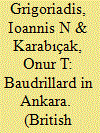

|
|
|
|
|
| Summary/Abstract |
Turkey’s recent democratic backsliding has been profoundly reflected in the near-complete government control of mass media. Pro-government mainstream media, rather than pursuing truth, has engaged in systematic production and dissemination of simulacra. Developed by Baudrillard, the concept of simulacrum can provide insights into the truth and reality perceptions of Turkish voters. This has been a topic widely discussed, given that produced simulacra establish a legitimation framework for the Turkish government’s domestic and foreign policies. Various print and electronic sources are studied to analyse the content of speeches and used techniques. In this study, Baudrillard’s scheme will be applied for the study of three political narratives dominant in the Turkish public sphere: Turkey’s ‘struggle for survival (bekâmücadelesi)’, the projection of key opposition leaders as ‘traitors’, and ideal leadership and diplomacy from past to present through two popular television series, ‘Diriliş Ertuğrul (Resurrection Ertuğrul)’ and ‘Payitaht Abdülhamid (Leader Abdülhamid)’.
|
|
|
|
|
|
|
|
|
|
|
|
|
|
|
|
| 2 |
ID:
180025
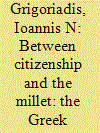

|
|
|
|
|
| Summary/Abstract |
As one of Turkey’s non-Muslim minorities, Turkey’s Greeks have faced substantial pressures since the founding of republican Turkey. As its members could not claim their constitutional rights as citizens of Turkey, emigration soared and the minority reached a point of near extinction. Significant improvements were noted when the EU-supported reform transformed the Turkish state and society from 1999 to 2010, which were not reversed as Turkey relapsed to democratic backsliding in the following years. This article explores the social dynamics and ideological frameworks that have contributed to novel perceptions of the Greek minority since after 2002, the year the Justice and Development Party (Adalet ve Kalkınma Partisi-AKP) came to power and have deterred a significant deterioration since Turkey’s democratic backsliding began. It also examines the state of Turkey’s Greeks by focusing on the state of the pious foundations, the Papa Eftim affair and the situation in the islands of Gökçeada (Imbros) and Bozcaada (Tenedos).
|
|
|
|
|
|
|
|
|
|
|
|
|
|
|
|
| 3 |
ID:
187484
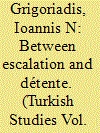

|
|
|
|
|
| Summary/Abstract |
This paper aims to evaluate the state of Greek-Turkish relations in light of recent developments in the reconfiguration of Turkish foreign policy. Following twenty years of détente and relative calm in bilateral relations, the year 2020 witnessed two escalations in Greek-Turkish relations, one in March involving refugees and immigrants on the Greek-Turkish land border and another in August involving military vessels of the two countries. The refugee crisis and potential military conflict regarding energy exploration in the Eastern Mediterranean have raised tensions at a moment the political and institutional tools for the promotion of conflict resolution between Greece and Turkey linked to Turkey’s EU membership perspective appear to be obsolete. This paper seeks an answer to the question of whether structural or ideational factors played the most prominent role in the recent escalation of the Greek-Turkish disputes.
|
|
|
|
|
|
|
|
|
|
|
|
|
|
|
|
| 4 |
ID:
190741
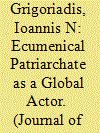

|
|
|
|
|
| Summary/Abstract |
Following the demise of the Ottoman Empire and the advent of republican Turkey, the Ecumenical Patriarchate has struggled to maintain its existence and its ecumenical role, despite the obstacles that the Republic of Turkey has set before it. Yet, challenges have abounded within the Orthodox world as well. The Patriarchate has viewed Russian involvement in Orthodox ecclesiastical affairs with suspicion, if not outright opposition. This is like its former stance regarding Russian involvement in Orthodox religious affairs in the Balkans and the Middle East throughout the nineteenth century. This competition has been rekindled since the end of the Cold War, as the Patriarchate has grown in importance as a global actor. The Ukrainian ecclesiastical crisis, which brought the Ecumenical Patriarchate and the Moscow Patriarchate to loggerheads, provides an additional opportunity to measure the extent of Russian influence on the Orthodox Church. This article explores the history of the Ecumenical Patriarchate in the republican Turkish era and the challenges it has faced. It also examines the dynamics that have developed since the end of the Cold War in its relations with Russia and Turkey through its confrontation with the Moscow Patriarchate particularly in light of the Ukrainian ecclesiastical crisis. This study aspires to shed light on the extent of Russian influence on Orthodox ecclesiastical affairs and explore the role of the Ecumenical Patriarchate in the global era
|
|
|
|
|
|
|
|
|
|
|
|
|
|
|
|
| 5 |
ID:
134588
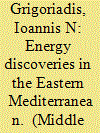

|
|
|
|
|
| Summary/Abstract |
The discovery of oil and natural-gas reserves in the Middle East at the beginning of the twentieth century changed the fate of the region. From a backwater of international politics, the Middle East became central to international strategic rivalries. Almost a century later, energy discoveries in the Eastern Mediterranean are unlikely to bring about such tectonic shifts in the strategic fortunes of the Levant. Yet they have generated a fresh interest in their potential impact on existing regional disputes and power constellations.
|
|
|
|
|
|
|
|
|
|
|
|
|
|
|
|
| 6 |
ID:
171190
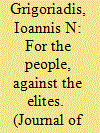

|
|
|
|
|
| Summary/Abstract |
While the rise of populism has been a global trend in recent years, it has been prevalent in Greece and Turkey for longer, leaving a strong imprint on the politics of both countries. Left-wing populism has become one of the constitutive elements of the Greek political party system since the collapse of the 1967–1974 military regime. The 2009 outbreak of the Greek economic crisis set the stage for the radicalization of Greek politics through the rise of extremist far-right and far-left populist parties that professed populist agendas of different hues. Such populists accused old-party personnel of being members of a “treacherous elite” that sacrificed Greek national interests against foreign powers. The 2011 “indignados” movement is key for the better understanding of the social dynamics that facilitated the rise of the unusual SYRIZA-ANEL coalition government. Debates on Greek constitutional reform also highlighted the relevance of populism, especially as the SYRIZA-ANEL government sought topics to resonate with its disenchanted voters. On the other hand, a right-wing populist rhetoric has been one of the key instruments for the rise of Turkish political Islam and the establishment of the AKP hegemony in Turkey. Establishing a Kulturkampf-based narrative about the “secularist, ‘white-Turk’ elites” versus the “conservative, ‘black-Turk’ people” was of great political significance. The constitutional reform process proved again crucial for manifesting the relevance of populism in Turkish political discourse. This article explores the circumstances under which left- and right-wing populism have emerged into a dominant feature of Greek and Turkish politics. It also discusses the decreasing relevance of the established left-right political divide in party politics and suggests alternative classifications.
|
|
|
|
|
|
|
|
|
|
|
|
|
|
|
|
| 7 |
ID:
082001
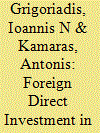

|
|
|
| 8 |
ID:
094619
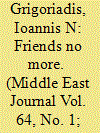

|
|
|
|
|
| Publication |
2010.
|
| Summary/Abstract |
This article examines the rise of anti-American nationalism in Turkey. While Turkish public opinion has developed strong views against a set of foreign policies furthered by the United States, recent findings allude to the development of an emerging anti-US bias in large segments of Turkish society. The deterioration of the US image in Turkey could be considered a result of the recent US involvement in the Middle East, as well as socio-political shifts inherent to Turkey's democratization process.
|
|
|
|
|
|
|
|
|
|
|
|
|
|
|
|
| 9 |
ID:
106102


|
|
|
| 10 |
ID:
165742
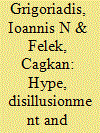

|
|
|
|
|
| Summary/Abstract |
Since the failed 2004 Annan Plan referendum, a special relationship between the Turkish Cypriot community and the EU institutions has been established. Increased unofficial contacts have paved the way for a reinforced role of sub-state actors, including Turkish Cypriot media. The role of the Turkish Cypriot media in shaping public opinion towards the EU has been largely correlated with the course of the Cyprus negotiations. Weak institutionalisation has negatively affected the influence of the local media on advancing the sui generis relationship between the Turkish Cypriot community and the European Union, as well as Europeanisation in the northern part of Cyprus. This article applies the theoretical framework of horizontal and vertical Europeanisation to explore the impact of local media on the relations between the European Union and the Turkish Cypriot community.
|
|
|
|
|
|
|
|
|
|
|
|
|
|
|
|
| 11 |
ID:
174166
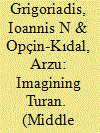

|
|
|
|
|
| Summary/Abstract |
While scholarly interest in the influence of Tatar intellectuals on Turkish nationalism has been strong, less attention has been paid to the interactions between Russian Azerbaijani and Ottoman Turkish intellectuals. This study applies theoretical tools developed by Benedict Anderson in the study of ethnic nationalism in the late Ottoman and Russian Empires. In doing so, this study focuses on the works of one leading intellectual from each side, Hüseyinzade Ali [Turan] and Mehmet Ziya [Gökalp]. Particular attention is paid to the concept of Turan, which they defined and elaborated as both a political ideal and a key element of the nationalist ideology they espoused through four poems they authored, two of which have homonymous titles. Their different views of the limits of the Turanian ‘imagined community’ and the political operationalization of the concept shed light on the development of ethnic nationalism in the declining Ottoman and Russian Empires. Ever since, Turan has become a significant symbolic conceptual tool that has fired the imaginations of Turkic nationalists (without, yet, having led to the establishment of a serious political movement).
|
|
|
|
|
|
|
|
|
|
|
|
|
|
|
|
| 12 |
ID:
103242


|
|
|
| 13 |
ID:
145640
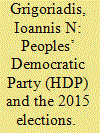

|
|
|
|
|
| Summary/Abstract |
The Peoples’ Democratic Party (Halkların Demokratik Partisi [HDP]) was one of the leading actors in Turkey's double parliamentary elections in 2015. Under the leadership of Selahattin Demirtaş, it has enjoyed great success, crossing the ten percent threshold and entering parliament in the June 7, 2015 elections. Yet the hype was mitigated by the party's poorer results in the November 1, 2015 elections. This electoral performance manifested the strengths as well as the limits of the HDP's ability to maintain its support in a polarized political environment. Yet the HDP remains an indispensable actor for the peaceful resolution of the Kurdish issue.
|
|
|
|
|
|
|
|
|
|
|
|
|
|
|
|
| 14 |
ID:
101827
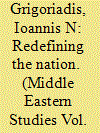

|
|
|
|
|
| Publication |
2011.
|
| Summary/Abstract |
While Greek and Turkish nationalisms have followed diverse historical paths, they share several features. Following the model of Zimmer, this study explores how inclusive and exclusive boundary mechanisms have shaped Greek and Turkish national identity and which symbolic resources were utilized in these processes. It is argued that a shift from the use of voluntaristic to that of organic boundary mechanisms has characterized both Greek and Turkish nationalisms and influenced the definition of national 'self' and 'other'. This study aims to track a pattern of historic-political conditions which favour a shift from voluntaristic towards organic models of defining the nation and discuss possible future trends.
|
|
|
|
|
|
|
|
|
|
|
|
|
|
|
|
| 15 |
ID:
158073
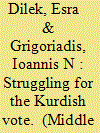

|
|
|
|
|
| Summary/Abstract |
This study explores the competition for Turkey's Kurdish vote through the instrumentalization of religion, ethnicity and victimhood in political competition. This becomes possible through the study of rally speeches of the Justice and Development Party (Adalet ve Kalkınma Partisi – AKP), the pro-Kurdish Peace and Democracy Party (Barış ve Demokrasi Partisi – BDP) and the Peoples’ Democratic Party (Halkların Demokratik Partisi – HDP), in Turkey's June 2011 and June 2015 general elections. The AKP campaigns framed the resolution of the Kurdish issue along with an updated version of the ‘Turkish Islamic Synthesis’. The issue of ethnicity was toned down in contrast to the idea of common victimhood of pious Turkish and Kurdish Muslims in republican Turkey. On the other hand, the BDP/HDP moved from a more ethnic-oriented and exclusive identity approach in 2011 to a more inclusive, liberal and extrovert agenda based on a civic definition of Turkish national identity in 2015. Religion and victimhood appear as the two most enduring symbolic resources for political party mobilization.
|
|
|
|
|
|
|
|
|
|
|
|
|
|
|
|
| 16 |
ID:
077265
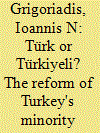

|
|
|
| 17 |
ID:
121182
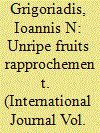

|
|
|